Security Integrator Supports Local Community During COVID through GSA MAS Contract
Reprinted with permission from ICU Technologies, a ClearCoast client. This blog post was originally posted Team ICU on Jul 9, 2020 9:26:30 AM.
___________________________
Lake Tahoe Community College’s (LTCC’s) leadership recently executed a plan to provide the community with a COVID Surge overflow hospital but transitioned to being one of only two COVID testing facilities in El Dorado County. Here is how it happened:
LTCC’s Superintendent/President, Jeff DeFranco was quick to recognize the challenges posed by the COVID crisis. Anticipating the need to support the Lake Tahoe community, DeFranco agreed to use part of the LTCC campus as an overflow hospital in the event the local hospital was overwhelmed with patients. Thankfully, the community was quick to protect themselves against the virus and a hospital surge location was not necessary. The work to prepare for hospital overflow, however, was not wasted. A new need arose – finding a suitable COVID testing facility.
LTCC’s Al Frangione, who oversees the college’s facilities and security, was assigned as the Incident Commander for the college. Frangione explained that DeFranco was “all in, to make sure the hospital overflow concept was a success.” Frangione quickly went to work, defining the necessary space, people, and materials. Frangione explained:
“One key component which is evident in any healthcare setting is security. Access control coupled with video monitoring of access points, perimeter and common spaces is a core responsibility which cannot be overlooked.”
Frangione reached out to ICU Technologies, LTCC’s preferred security integrator, to get an initial design. He explained, “I’ve worked with ICU in the past and am familiar with their GSA/CMAS contract process which cuts through the red tape and makes purchasing and installation as streamlined as possible — especially in an emergency.” He added, “In uncertain times, some companies might up their pricing, but partnering with companies like ICU, which are GSA/CMAS contract holders, protects us as the pricing schedule is in place prior to the emergency and has been approved as being legal, reasonable, and competitive.” An initial assessment led to a decision to install nine public safety cameras and electronic access control to monitor doors at the exterior entrances.
Within a few weeks, the fears about patient overload passed and El Dorado County officials recognized the need for a suitable testing location. Frangione explained, “Since Lake Tahoe Community College was mission-ready, we were selected as one of two county facilities for this critically important work.” The testing location required high levels of security for patients, testing staff, equipment, and to effectively control the security of the samples themselves. To date, 2,800 people have been tested. Details about testing can be found at: https://www.edcgov.us/Government/hhsa/Pages/EDCCOVID-19-Get-A-Test.aspx
ICU’s CEO, Brian Van Norman, said, “we’re happy to support LTCC in this critically important public health undertaking.” He added, “We applaud LTCC Superintendent/President Jeff Defranco’s vision and forward-thinking response.” Van Norman continued by explaining, “We are proud our company has the ability to quickly respond to meet community needs through our well established industry relationships, with manufacturer partners like Motorola-Avigilon, and our large subcontractor network that spans the Western States.”
Public sector leaders with security related issues should contact ICU Technologies at: icu-techinc.com


